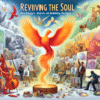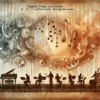The Heart of Emotion: Exploring the Soulful Ballad Genre

Music transcends borders, cultures, and generations, serving as a universal language that conveys complex emotions and narratives. Within this vast musical landscape, the soulful ballad genre stands out as a poignant expression of deep feelings, experiences, and human connections. This article delves into the intricacies of soulful ballads, examining their characteristics, notable artists, and the emotional resonance they carry.
What is a Soulful Ballad?
Soulful ballads represent a unique convergence of musical styles, primarily characterized by their emotional intensity and lyrical storytelling. These songs often convey themes of love, heartbreak, longing, and personal reflection. The genre emerged from the fusion of rhythm and blues (R&B), gospel, and pop traditions, enabling artists to connect with audiences on a profound emotional level.
Characteristics of Soulful Ballads
Emotional Intensity: At the core of any soulful ballad is its ability to evoke strong emotions. The combination of heartfelt lyrics, impactful melodies, and expressive vocal performances creates an immersive experience for the listener.
Lyricism: Soulful ballads often feature poignant storytelling. The lyrics delve into the complexities of human relationships, exploring themes such as love’s struggles, loss, and vulnerability. This narrative style invites listeners to reflect on their own experiences.
Vocal Delivery: The power of soulful ballads lies in the vocal performance. Artists often employ a range of techniques, such as melisma, vibrato, and dynamic shifts, to convey emotion authentically. A heartfelt delivery can transform a simple love song into a powerful anthem.
- Instrumentation: While soulful ballads can vary in instrumentation, they usually feature elements like piano, strings, and subtle percussion that complement the vocal line. This creates a warm and inviting atmosphere, further enhancing the emotional impact.
Historical Context of Soulful Ballads
Soulful ballads have deep roots in African American musical traditions, particularly in the early 20th century. The genre evolved as artists sought to articulate the complexities of their experiences in a society marked by social and racial challenges.
See Also: Reviving the Soul: How Today's Artists Are Redefining the Genre
Reviving the Soul: How Today's Artists Are Redefining the GenreThe Influence of Gospel and R&B
The emotional depth found in gospel music significantly influenced the soulful ballad genre. Gospel's powerful vocal delivery, rich harmonies, and spiritual themes permeated the works of many singers who transitioned from church choirs to mainstream music. Artists such as Aretha Franklin and Sam Cooke skillfully blended gospel elements with R&B, paving the way for the soulful ballad's rise in popularity.
The Golden Era of Soulful Ballads
The 1960s and 1970s are often considered the golden era of soulful ballads, with artists like Al Green, Marvin Gaye, and Otis Redding dominating the charts. Their songs captured the essence of love, hope, and heartache, appealing to a wide range of audiences. Hits like Green's "Let's Stay Together" and Redding's "Try a Little Tenderness" continue to resonate today, highlighting the timeless nature of the genre.
Notable Artists and Their Impact
Several artists have left an indelible mark on the soulful ballad genre, shaping its evolution through their voices and songwriting abilities.
See Also: Timeless Tunes: The Evolution of Soulful Ballads Through the Decades
Timeless Tunes: The Evolution of Soulful Ballads Through the DecadesAretha Franklin
Known as the "Queen of Soul," Aretha Franklin's impact on the soulful ballad genre is immeasurable. Her haunting renditions of songs like "Natural Woman" and "I Never Loved a Man" showcased her extraordinary vocal range and emotional depth. Aretha's music not only entertained but also empowered listeners to embrace their emotions.
Marvin Gaye
Marvin Gaye's influence is undeniable when discussing the evolution of soulful ballads. His albums, like "What's Going On," infused social commentary into love songs, addressing issues that resonated deeply with listeners. Tracks such as "Let's Get It On" and "Sexual Healing" remain classics, illustrating the power of love and desire through soulful melodies.
Adele
In contemporary music, Adele stands out as a leading figure in the soulful ballad genre. With her rich vocal texture and deeply personal lyrics, she has captivated audiences worldwide. Songs like "Someone Like You" and "Hello" draw from the same emotional wellspring that characterized earlier ballads, proving that the genre's essence endures across generations.
See Also: Soulful Ballads: Uniting Generations with Their Emotional Depth
Soulful Ballads: Uniting Generations with Their Emotional DepthThe Importance of Soulful Ballads in Music and Society
The significance of soulful ballads extends beyond mere entertainment. They serve as platforms for emotional expression and connection, allowing listeners to grapple with their feelings and experiences through the lens of music.
A Reflection of Humanity
Soulful ballads provide a mirror that reflects the intricacies of human emotion. They are a means of catharsis for both artists and listeners, facilitating healing and understanding in times of struggle. By exposing vulnerability, these songs create a sense of empathy and shared experience, transcending cultural and geographical barriers.
Cultural Representation
Through its rich history of storytelling, the soulful ballad genre has offered a voice to communities often marginalized in mainstream society. The artists who emerged from this genre have used their platforms to address social issues, bringing awareness to topics such as love, inequality, and resilience. This cultural representation fosters a deeper appreciation for the diverse human experience.
See Also: 10 R&B Love Songs That Defined a Generation and Shaped Romance
10 R&B Love Songs That Defined a Generation and Shaped RomanceConclusion
The soulful ballad genre embodies the heart of emotion in music. Its rich history, characterized by emotional intensity, storytelling, and powerful vocal performances, continues to resonate with audiences worldwide. As we explore the intricate layers of soulful ballads, we recognize their profound impact not only on the music industry but also on our collective understanding of love, loss, and the human experience. This genre remains vital, reminding us that music has the power to heal, connect, and inspire.
FAQs
1. What defines a soulful ballad?
A soulful ballad is characterized by its emotional intensity, poignant lyricism, expressive vocal delivery, and often features instrumentation that enhances the emotional atmosphere.
2. What are some classic examples of soulful ballads?
Classic examples include Aretha Franklin's "Natural Woman," Marvin Gaye's "Let's Get It On," and Otis Redding's "Try a Little Tenderness."
3. How has the soulful ballad genre evolved over the years?
The soulful ballad genre has evolved by incorporating elements from various musical styles while maintaining its emotional core. Contemporary artists like Adele continue to contribute to the genre, blending modern influences with traditional soulful elements.
 The Anatomy of a Soulful Ballad: What Makes These Songs So Moving?
The Anatomy of a Soulful Ballad: What Makes These Songs So Moving?4. Why are soulful ballads important in society?
Soulful ballads serve as a reflection of human emotions and experiences, fostering empathy and connection. They provide a platform for representation and address social issues, promoting understanding among diverse audiences.
If you want to know other articles similar to The Heart of Emotion: Exploring the Soulful Ballad Genre you can visit the category Soul.
